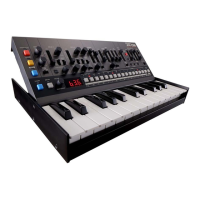Using the Arpeggio
25
Indication Value Explanation
You can create a shuffle rhythm by varying the upbeat timing. Larger values
give more of a bouncing, dotted-note rhythmic feel.
When this is set to “0,” the downbeat and upbeat are played at equal
[4]
rESo
This sets the note value (upbeat note) that the shuffle is based on.
rESo
16th
rESo
8th
[5]
Oct
-3
3
Sets the range in octaves over which the arpeggio plays. Setting this to a
“+” value makes the arpeggio play up an octave from the key(s) you press,
and setting this to a “-” value makes the arpeggio play down an octave from
trns
-36
36
Shifts (transposes) the arpeggio notes in semitone steps.
[7]
dvr
0
100
Sets the length of each note played by the arpeggiator. Larger values
lengthen the note value (tenuto), whereas smaller values shorten the note
[8]
UELO
REAL
1
127
Sets the velocity of notes played by the arpeggiator.
To make the arpeggio play at the strength (velocity) with which you play
the keys, set this to “REAL.”
To make the arpeggio play at the same strength (velocity), set a value from
1
127
[9]
HoLD
OFF
On
On
,” the arpeggio keeps playing even after you take
your hands of the keyboard.
You can also switch this on/off by pressing the [ARPEGGIO] button while
holding down the [NOTE] button.
You can also press a step button to select the parameter items.
● To play chords using an external MIDI keyboard connected to this unit, set the MIDI receive and transmit channels

